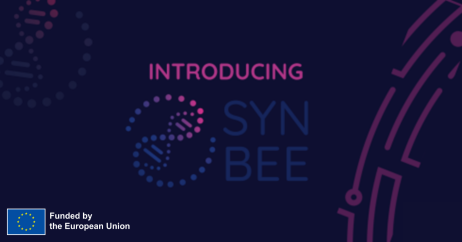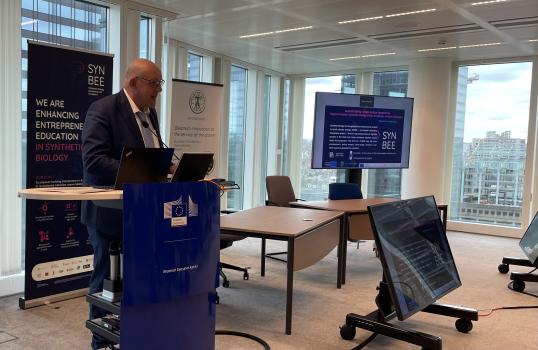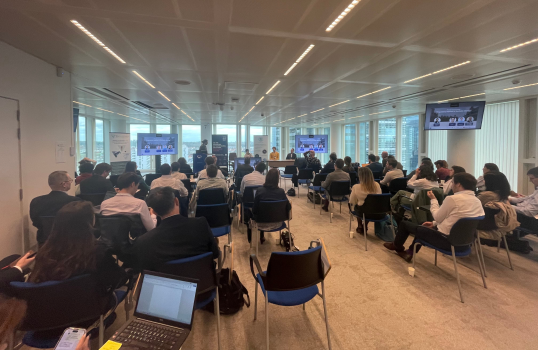
The SYNBEE project, stands for Expanding SYNthetic Biology Entrepreneurial Ecosystem. This initiative, funded by the European Innovation Ecosystems (EIE) Programme – as part of the Horizon Europe Programme - is coordinated by Da Vinci Labs in France.
The project's core objective is to cultivate entrepreneurial ecosystems centered around synthetic biology. Synthetic biology is a transformative technology, paving the way for novel processes and products across industries such as healthcare, food production, environment, energy, and beyond.
While European research institutions boast exceptional scientific prowess in this domain, their commercial utilisation remains largely untapped.
SYNBEE is helping the entrepreneurial expertise of emerging synthetic biology professionals and students, within European innovation networks, to establish synthetic biology enterprises in Europe and improve their employability
The project’s distinctive approach will leverage the expertise of key players in the synthetic biology landscape, encompassing academic centers of excellence alongside their accelerators, incubators, technology transfer offices, and industry partners.
With the support of stakeholders from 25 European countries who share the collective vision, SYNBEE is backing a thriving ecosystem conducive to synthetic biology entrepreneurship.
European Innovation Council (EIC) x SYNBEE Day
The EIC x SYNBEE Day held in April 2024 is a testimony to the commitment of SYNBEE and its partners to advancing the field of synthetic biology. Hosted by the Programme Managers of the European Innovation Council (EIC) and SYNBEE, this event served as a platform to highlight the immense potential of synthetic biology in addressing climate change and fostering sustainability.
Renowned researchers, scientist and entrepreneurs shared groundbreaking research, and discussed the transformative potential of SynBio.
A highlight of the event was the SYNBEE Pitch Competition, where 9 promising startups (Algaevity; inLux Biotech; Celluol; Asteasier; BioHalo; NoPest; Syngens; Electric Skin; Laastix) showcased their innovative solutions for a greener, more sustainable future. Three projects were crowned as the winners of the Pitch Competition:
- Laastix for crafting high-quality, reliable, and sustainable rubber with a low carbon footprint.
- BioHalo for pioneering biofluorination technology as a sustainable alternative to conventional fluorochemistry practices.
- Syngens for harnessing AI-powered DNA design for limitless opportunities in synthetic biology.
Moreover, the event served as a platform for forging strong collaboration links among researchers, industry leaders, and policymakers.
To know more about the EIC x SYNBEE day, watch the full video of the event on their Youtube Channel and visit their Website.
Background Information
The SYNBEE project, funded by the European Innovation Ecosystems (EIE) Programme (as part of the Horizon Europe Programme), stands as a beacon of opportunity for aspiring entrepreneurs, particularly the young and underrepresented, within the growing sector of synthetic biology. By championing entrepreneurial education and fostering collaboration among diverse stakeholders, SYNBEE is not only driving innovation but also paving the way for increased participation of women and other underrepresented groups in this dynamic industry.
As they embark on this journey, SYNBEE aims to break down barriers, empower aspiring innovators, and unlock the transformative potential of synthetic biology entrepreneurship across Europe.
SYNBEE brings together 7 prominent partner entities, including Häme University of Applied Sciences (Finland), Delft University of Technology (Netherlands), INRAE Transfert SAS (France), Biocatalyst Foundation (Latvia), F6S Network Ireland Limited (Ireland), Riga Technical University (Latvia), alongside 7 Associated partners: Max Planck Institute of Biochemistry (Germany), Imperial College of Science Technology and Medicine (United Kingdom), Potter Clarkson LLP (United Kingdom), Start Codon (United Kingdom), iGEM Foundation (France), CEA (France), German Association for Synthetic Biology - GASB e.V. (Germany).
Details
- Publication date
- 23 April 2024
- Author
- European Innovation Council and SMEs Executive Agency


